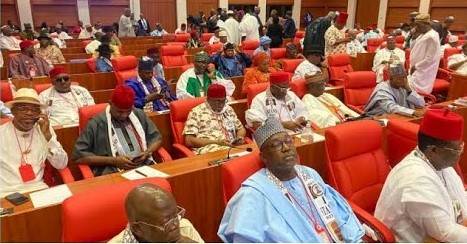By Prof Nnamdi Obiaraeri
Many do not believe that elections can ever be democratic in Nigeria. Nigeria does not have good democratic credentials. This has led pessimists to consistently reach the conclusion that nothing good can ever come out of Nigeria and her elections. The sceptics intone that Nigeria remains a country where the best appears impossible, but the worst will never happen.
On the contrary, optimists believe that election in Nigeria is work in progress although Nigeria is making very slow progress in that regard but with the right leadership in place, a new Nigeria is possible. The avid hopers acknowledge that election in Nigeria is an embarrassment, but they refuse to give up on Nigeria and her democracy given the humungous untapped human and material resources that inhabit that geopolitical space.
Before the swearing in of the President-elect on 29 May 2023 and after the proclamation by President Tinubu that the National Assembly will be inaugurated on 13 June 2023, Nigerians were exposed to rounds of fierce electioneering campaigns by candidates for leadership positions in the Senate and House of Representatives [otherwise called the National Assembly].
Coming after the yet to heal wounds of the hotly contested 2023 general elections, the polity was so heated that many thought that Nigeria will further disintegrate after the National Assembly leadership elections. Elections have always left the nation further disunited. As a result, many were prepared to bet that the leadership elections will leave visible cracks in the different Chambers of the Nigerian parliament.

The reasons for these cynicisms were not far-fetched. Campaigns for the top leadership positions in the National Assembly (being President of Senate and Deputy Senate President on one hand and Speaker and Deputy Speaker of the House of Representatives on the other hand) were predicated on the usual national fault lines- religion, ethnicity, and zoning (“turn by turn” syndrome) and, of course, power of the purse. These primordial considerations were so elevated that they drowned the core issues of merit, competence, character, credibility, and legislative experience which should have dominated the debates about the eligibility of the candidates.
The intensities of the campaigns were further heightened by open anointing of preferred candidates for these leadership positions by the powers that be in the ruling party. This development irked those not favoured by it and they worked so hard to sell it to the generality of Nigerians as threatening the independence of the legislature.
Ideally, campaigns for leadership positions in the legislature should be restricted only to those eligible to vote. In this case, the 109 Senators elect, and 360 House of Representatives members elect. On the contrary, campaigns for the 2023 National Assembly leadership positions were thrown open and vigorously mounted publicly as though it was another general election involving all Nigerians. It was this charged and acrimonious mood that greeted the very key and sensitive election of leaders of the National Assembly, which held on June 13, 2023.
In retrospect, the elections have come and gone and the presiding officers in the Senate and House of Representatives have been duly elected and sworn in. In addition, the other lawmakers (Senators and House of Representatives members) have also been inaugurated. The 10th National Assembly is now in place for full legislative business as required under section 4 of the Constitution of the Federal Republic of Nigeria as amended.
It is heart-warming that at the conclusion of the elections in both Chambers of the National Assembly, Nigeria did not disintegrate further because of the outcome of those elections as predicted by naysayers. Besides, no visible cracks were recorded in the national parliament so far. Rather, useful democratic lessons came to the fore to the effect that elections can be free, fair, and credible in Nigeria.
The practical useful lessons from the 10th National Assembly leadership elections include but are not limited to the following:
1. Elections can be free.
All the candidates for the President of Senate or Speaker of the House of Representatives positions were allowed to contest after they received their nominations. Two Senators contested for the office of Senate President and three candidates contested for the office of the Speaker of the House of Representative. No candidate was unlawfully disqualified or otherwise put to an undue disadvantage or given the usual “Go to Court” treatment that characterise elections in Nigeria.
There is no doubt that intrigues and power play outside the legislative Chambers may have forced some aspirants to drop their ambitions, but it is unarguable that the aspirants who stepped down or did not take part in the election proper did so on their own accord. The National Assembly bureaucracy did well to provide level playing field for all the candidates. This equal opportunity otherwise called level playing field is what is lacking in intra-party contests during primary elections and in the general elections conducted by the INEC.
2. Elections can be fair.
By all parameters, the National Assembly leadership elections were hotly contested. So much was at stake for different reasons. Every contestant, whether anointed or not, put in a lot of work and resources. All of them ran to win. Despite the stiff competitions, on the voting day, the procedures adopted were manifestly fair, unbiased, and even-handed. The processes and or outcomes were not manipulated or adapted or predetermined to favour or disadvantage any candidate(s). This is what is always lacking in intra party elections and in general elections conducted by the INEC.
3. Elections can be credible.
Election is a process not an event. Thus, accreditations of eligible voters in the National Assembly leadership elections were done seamlessly using reliable voters register of Senators-elect or House of Representatives members-elect. No impostors or anyone who was not qualified to participate was smuggled in to vote. There was no “mago mago” or “wuru wuru” or supplanting of voters/delegates lists.
The announced time and venue for the elections in both Chambers were strictly kept. Being a one venue election, there was no unilateral change of venue as is always the case with party primary elections. There was no suppression of votes or late arrival of voting materials as is the case with the general elections conducted by the INEC.
4. One man one vote principle can work.
The principle of one man one vote was adopted and upheld in the National Assembly leadership elections. Every eligible voter (Senator or House of Representatives member) was allowed to cast his or her vote. There was no voter intimidation, no thugs to disrupt proceedings or forcefully carry the mace or undue interferences. No undue militarization of the process was recorded unlike what obtains during party primary elections or general elections conducted by the INEC where the security agencies will be too willing to be used to rig elections.

5. Votes can be counted and counted votes can count.
Whether by secret ballot (as was used in the Senate) or voice vote (as was used in the House of Representatives), votes were counted, and results were declared as counted. There was no double voting or over voting or ballot box stuffing. Sanctity of votes as a key element of free, fair, and credible election is what is lacking in the party primary elections or general elections conducted by INEC.
6. Openness and transparency enhance the credibility of electoral outcomes.
The National Assembly leadership elections were conducted and beamed live on many television channels. Voting and collation of results were done live and direct in front of the candidates, their agents, and the voters. Interested members of the public followed the proceedings via television cameras and other networks. The useful lesson that television cameras enhance the credibility of the electoral process, and its outcomes cannot be lost on all and sundry. There is really nothing to hide unless there is something the umpire, arbiter or referee is hiding.
7. A winner can be magnanimous in victory and a loser need not be sore or bitter.
Christopher Earle was apt when he advised those who engage in competitions to “Be humble in victory and gracious in defeat”. The respective winners of the highly coveted presiding officer positions spoke maturely without gloating. They extended hands of fellowships to their co-contestants and other lawmakers while keeping their eyes on the onerous responsibilities that come with their esteemed positions. Significantly, the respective losers promptly accepted the voting outcomes in good faith without the necessity to be sour or sore or seek judicial adjudication. That is the spirit of sportsmanship the Nigerian politicians must imbibe. Wailing can be done with dignity.
In sum, the 10th National Assembly leadership elections have clearly demonstrated that no reasonable person will question the outcome of any free, fair and credible election. It is hoped that the political parties, the INEC and other stakeholders in election management have seen and learnt that elections in Nigeria can be free, fair and credible.
The biggest outstanding democratic lesson the 10th National Assembly will teach after their four-year legislative term expiring in 2027 is that the parliament can work for the Nigerian people. Congratulations to the Senate President, the Speaker of the House of Representatives, and all members of the National Assembly. To whom much is given, much is expected. A new normal is possible!
- Prof Obiaraeri, Nnamdi .O. is a Professor Of Law at Imo State University, Imo State University





